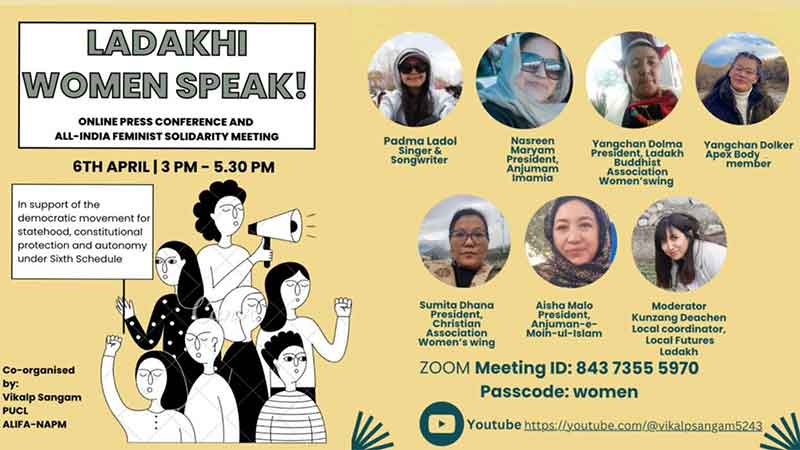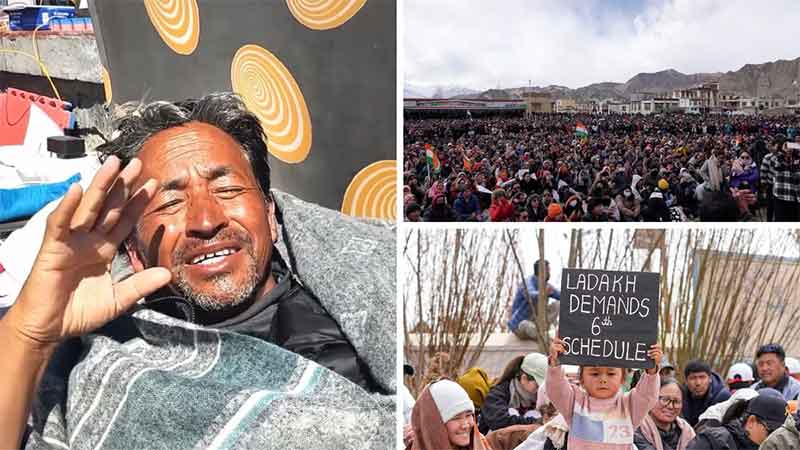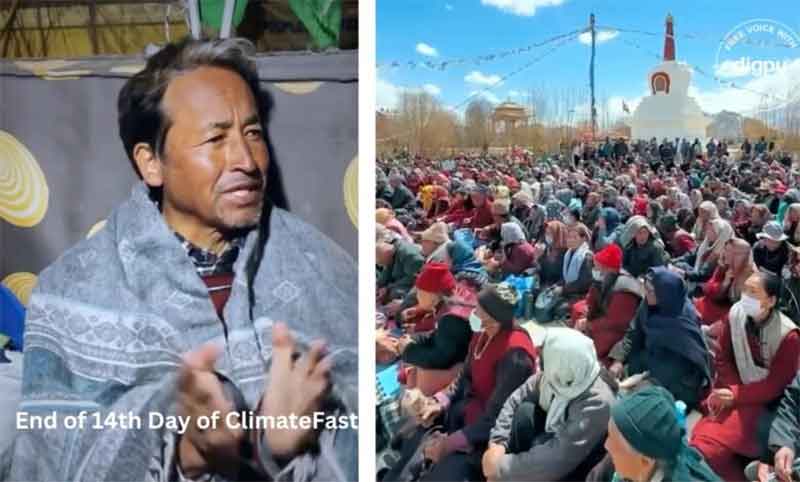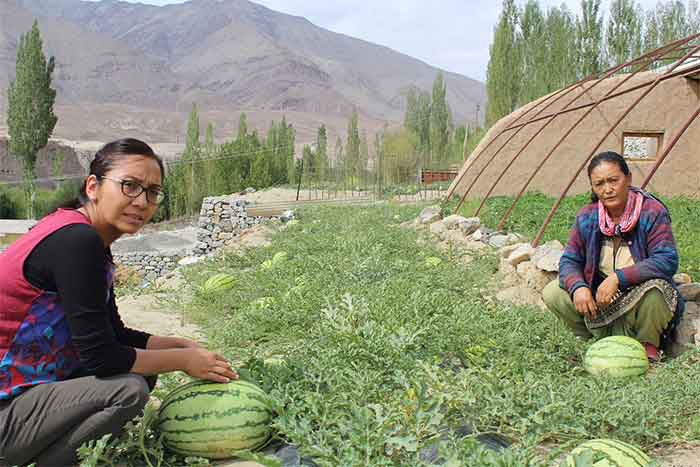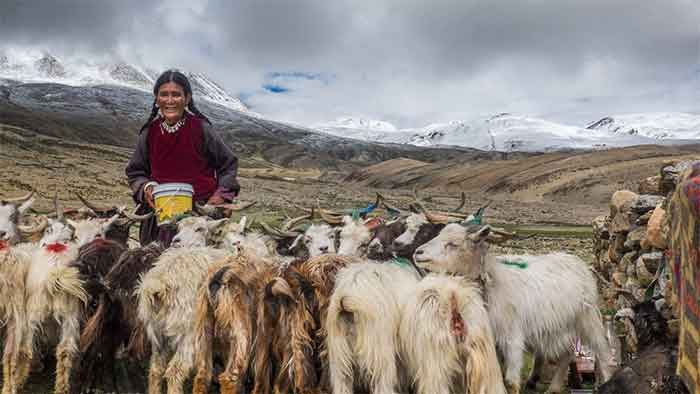
We strongly support the demand by the people of Ladakh, that the Government of India include Ladakh in the Sixth Schedule of the Indian Constitution and accord it statehood, so that the land, culture, environment and the economic interests of the Ladakhi people can be safeguarded for current and future generations. We also express deepest shock about the way in which the demand for the Sixth Schedule status that Ladakhis have been making for many years, has been systematically sidelined. We are distressed at the attempted silencing of voices such as that of the well-known educationist and innovator Sonam Wangchuk, through completely illegitimate gag orders. Notably, Wangchuk has also been raising larger concerns of the impacts of the climate emergency, and action to save the region’s glaciers..
In August 2019, Ladakh received the Union Territory status that the people of Ladakh, especially in the Leh district, had been demanding for over seven decades, because their aspirations were long ignored by the then Jammu and Kashmir state government. This new status had the potential for political and economic emancipation as determined by the people of Ladakh. However, UT status without legislature, or adequate constitutional safeguards to protect the unique cultural identity and fragile ecosystem and culture of Ladakh, has jeopardized this potential. On January 2, 2022, the Ministry of Home Affairs (MHA) constituted a high-powered committee for Ladakh to look over the region’s development but didn’t mention the demand for the 6th Schedule despite unequivocal local demands. The committee was rejected by the Leh Apex Body and Kargil Democratic Alliance for not specifying the issues they have been demanding.
Over 90% of the Trans-Himalayan biogeographical zone within India is located in Ladakh, an area which harbours a high diversity of many endangered animals like the wild yak, snow leopard, and black necked crane. It also has a unique social and cultural mosaic that evolved over centuries. The people in the region with more than 90% Indigenous population have a distinct ethnic identity, language, value systems, traditions, and an extraordinary way of life suffused with profound spiritual and religious principles in tune with the natural surroundings. The region with its vibrant local diversity further adds to India’s rich diversity.
There is a genuine fear that UT status without constitutional safeguards in Ladakh’s governance, could result in the kind of extractive modern unsustainable development that has impacted the rest of India. Unregulated growth in tourism, influx of businesses and large corporate houses, mining interests, could destroy the fine balance that Ladakhis have achieved while pursuing their livelihoods as well as exacerbate the glacial loss that is already a huge concern, threatening to impact livelihoods of not just the Ladakhis but of millions of Indians who depend on its waters. Corporate giants have already begun exploring the area for business opportunities (including in tourism) and prospecting for minerals and other natural resources. If they are given an open access, Ladakh will be damaged beyond repair. Given the kind of evidence emerging of the impacts of big infrastructure projects in Joshimath and elsewhere in the Himalaya, caution regarding what kind of development should be allowed in Ladakh is especially warranted.
The ruling party in New Delhi had promised adequate Constitutional safeguards after Ladakh became a Union Territory in 2019. Even the National Commission for Scheduled Tribes recommended the inclusion of Ladakh under the Sixth Schedule for democratic devolution of powers, preserving the cultural heritage of the region, its customary governance system, ensuring agrarian rights of local people, and enhancing transfer of funds for regions development needs. However, none of the promises made by the ruling party were kept, leading to increasing insecurities in the Ladakhi people over their land, resources and livelihoods leading to massive protests in both Kargil and Leh districts.
A special Constitutional status to Ladakh should include adequate powers with the Kargil and Ladakh Autonomous Hill Development Councils to exercise control over land, natural resources including minerals, tourism, and development policy. Additionally, we strongly recommend that the villages of Ladakh be empowered under the Fifth Schedule of the Constitution, if it is possible to include an area under both Schedules. This would include the application of the Panchayat (Extension to Scheduled Areas) Act to empower gram sabhas and not only panchayats. This is essential for local self-governance, and for the people of Ladakh to be involved on a direct and day-to-day basis in determining their present and future. Both the 5th and 6th Schedules are in principle applicable to Ladakh given that more than 90 percent of the population are of Scheduled Tribe status. Additionally, the Scheduled Tribes and Other Forest Dwellers (Recognition of Forest Rights) Act 2006 should be expediently applied with the full empowerment of local communities, especially to enable pastoral and other ecosystem-dependent communities secure collective rights over landscapes essential for their livelihoods.
Furthermore, without such safeguards and a clear mandate for the people of Ladakh to determine their own future, the government would disrespect the decades-old trust of the local people in the Union of India, and their contribution to maintaining security in our border areas. Ladakhis have put their lives in danger during all the wars in the region and stood like a bulwark against unfriendly neighbours. Thus, the interests and aspirations of the people of the region, and the environment they depend on, need to be honoured and fulfilled.
We urge the Government of India to urgently agree to the demands of Ladakhi people and help protect this unique ecological and cultural landscape.
———————–
* The Vikalp Sangam Core Group (VSCG) is the coordinating mechanism for the Vikalp Sangam process (www.vikalpsangam.org), which aims to network movements, organisations and individuals working on alternatives to unsustainable, iniquitous development. It contains about 85 organisations and networks across India, listed below.
Full list of Vikalp Sangam Core Group members is at
https://vikalpsangam.org/article/statement-and-appeal-on-ladakhs-constitutional-status/
Contact persons on behalf of the VSCG:
Karma Sonam (k[email protected] )
Tsewang Namgail ([email protected] )
Shrishtee Bajpai ([email protected] )
Ashish Kothari ([email protected] )

